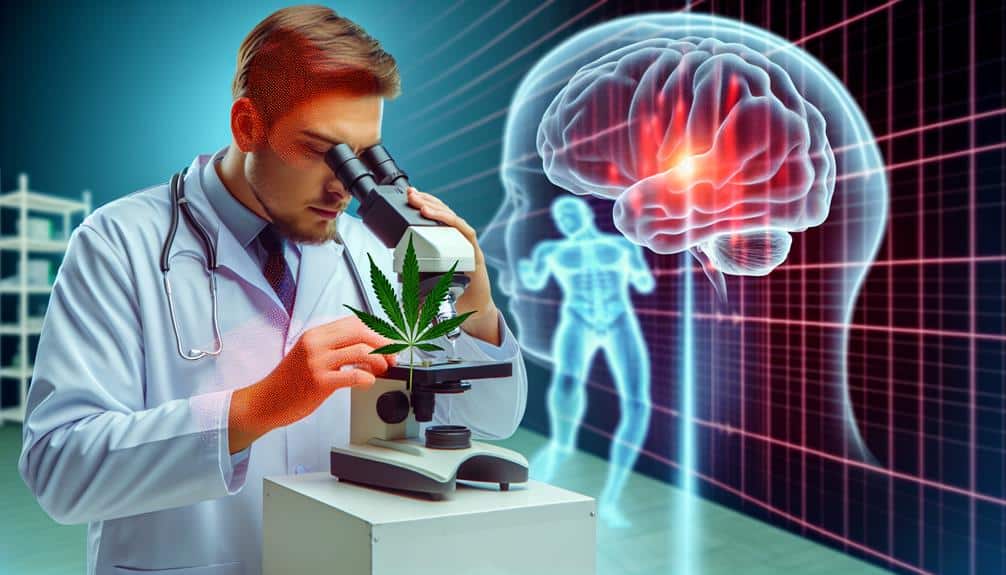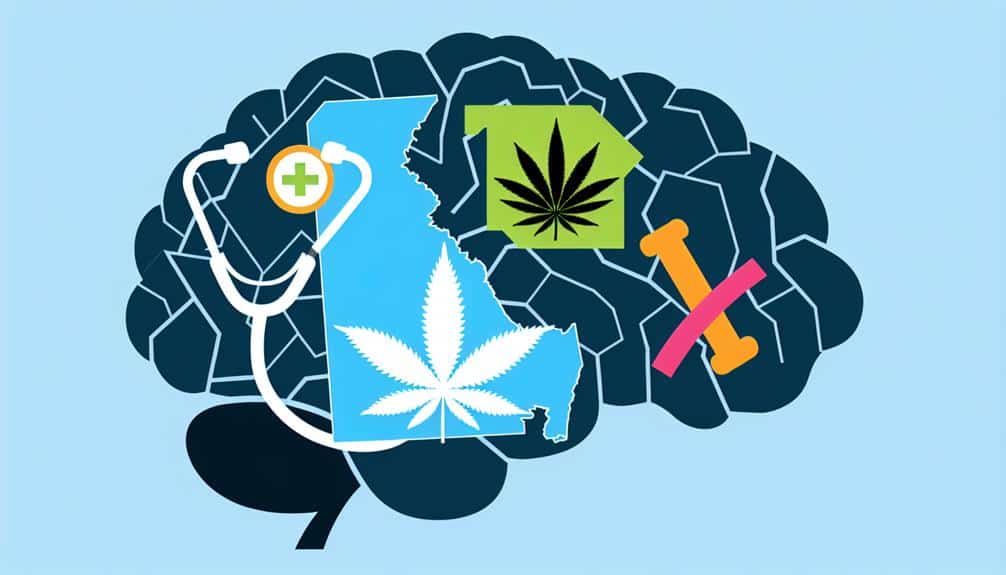Similar to the renowned Dutch city, Amsterdam, which is globally recognized for its liberal stance on cannabis, Delaware is emerging as a progressive state in the field of medical marijuana. You might have heard about how medical marijuana is revolutionizing advanced pain management in Delaware. With its forward-thinking legislation and growing body of research, cannabis provides patients with an alternative avenue for pain relief. But how exactly does this plant-based remedy work? And more importantly, what does this mean for the future of pain management? Stay tuned as we delve into this intriguing topic.
Table of Contents
Understanding Medical Marijuana

To fully comprehend the impact of medical marijuana on pain management in Delaware, it’s crucial to understand what it is and how it functions. Commonly known as cannabis, medical marijuana is derived from the Cannabis sativa plant which contains over 100 different chemicals called cannabinoids. Each has a distinct effect on the body. The two primary chemicals used in medicine are Delta-9-tetrahydrocannabinol (THC) and Cannabidiol (CBD).
The classification of Cannabis Strains is essential in understanding their therapeutic usage. Indica strains are known to provide physical relaxation while Sativa strains offer more invigorating effects. Hybrid strains strike a balance between both. The right strain can be instrumental in alleviating specific types of pain.
The effectiveness of medical marijuana also heavily depends on Marijuana Consumption Methods. Smoking or vaporizing allows for rapid delivery into the bloodstream, providing quick relief. Edibles and pills, however, offer a slower onset but longer-lasting effects. Topical applications are also popular for localized pain relief.
Delaware’s Medical Marijuana Legislation
While exploring the therapeutic benefits of medical marijuana, it’s crucial to understand Delaware’s specific legislation regarding its use. In Delaware, the medical marijuana program commenced in 2011 with the passing of the Delaware Medical Marijuana Act. However, the path hasn’t been smooth with legislative hurdles and policy impacts affecting the program’s evolution.
- The Act allows qualified patients to possess up to six ounces of marijuana. However, you can’t grow your own plants which poses a challenge for some patients.
- The list of qualifying conditions has expanded over the years but it’s still limited. This has been a significant legislative hurdle restricting access for many who could benefit.
- The state has four operational dispensaries but their distribution is uneven. This creates access issues and impacts the policy’s effectiveness.
- Finally, the law doesn’t protect employees from being fired for medical marijuana use which deters potential users.
Understanding these legislative intricacies is vital to effectively navigate the medical marijuana landscape in Delaware. Always remember that your desire to serve others starts with being informed about laws governing their access to care.
The Science Behind Cannabis and Pain

You might often wonder how exactly cannabis alleviates pain. The answer lies in the complex interplay between cannabinoids, the body’s endocannabinoid system, and our perception of pain. When you consume cannabis, its active compounds, cannabinoids, interact with the cannabinoid receptors spread across your body. These receptors, primarily CB1 and CB2, are part of your endocannabinoid system.
CB1 receptors predominantly found in your brain are crucial in pain perception. When cannabinoids bind with these receptors they act as a ‘dimmer switch’, decreasing the intensity of the pain signals sent to your brain. This results in you feeling less pain.
On the other hand, CB2 receptors mainly located in your immune system play an essential role in inflammation and potentially pain. When cannabinoids interact with these receptors they can reduce inflammation which is a significant source of chronic pain.
In essence, cannabis’s pain-relieving properties aren’t simply due to a single component but a complex intricate network involving cannabinoids cannabinoid receptors and your body’s systems. It’s a precise delicate dance that continually evolves and it’s this interplay that holds the key to understanding how medical marijuana could shape the future of pain management in Delaware and beyond.
Patient Eligibility for Medical Marijuana
Determining eligibility for medical marijuana involves thorough understanding of Delaware’s qualifying conditions and regulations. Let’s delve into specifics of eligibility criteria helping you decipher if you might qualify for marijuana prescription.
Delaware’s medical marijuana program adheres to a precise set of qualifying conditions including:
- Debilitating conditions that produce severe persistent pain.
- Terminal illnesses where patient life expectancy is under one year.
- Conditions causing seizures such as epilepsy.
- Conditions causing severe persistent muscle spasms such as multiple sclerosis.
If you have one of these conditions, you’re a step closer to eligibility. However, it’s important to note that a doctor’s recommendation is mandatory. They need to certify that standard treatments have been ineffective and medical marijuana could provide relief.
Next, you’ll need to apply through the state’s registry. This involves some paperwork and a fee. Approval doesn’t mean you can buy marijuana anywhere – you’ll need a designated state-licensed dispensary.
Understanding the above criteria will help navigate your eligibility for medical marijuana. Remember this is a medical decision and it’s essential to involve your healthcare provider in the process.
Medical Marijuana Dispensaries in Delaware

Navigating the landscape of medical marijuana dispensaries in Delaware requires understanding of state specific regulations and unique offerings of each dispensary. The dispensary licensing process is rigorous designed to ensure only high-quality safe effective products are available for patients.
You’ll find considerable product variety in dispensaries ranging from traditional dried cannabis to oils tinctures edibles and topical applications. Each product is carefully cultivated and processed to meet stringent health safety standards. Furthermore dispensaries employ knowledgeable staff who can guide through selection process providing precise information about each product potency cannabinoid profile suggested uses.
However it’s essential to remember while dispensaries offer array of options not all products may be suitable for your specific pain management needs. It’s advisable consult with your healthcare provider or dispensary’s medical professional before making a selection.
Therapeutic Benefits of Medical Cannabis
Unraveling the therapeutic benefits of medical cannabis you’ll find plethora of studies highlighting its efficacy in managing wide range of pain conditions. From neuropathic to chronic pain, the cannabinoid pharmacology of medical marijuana offers significant relief where other treatments often fail.
Delving deeper into benefits of medical marijuana we can list:
- Pain Management: Specific cannabis strains’ efficacy in pain management is well-documented offering potent alternative to traditional painkillers.
- Anti-Inflammatory Properties: Cannabinoids can reduce inflammation aiding in treatment of conditions like arthritis and inflammatory bowel disease.
- Neuroprotective Features: Cannabis has shown potential in treating neurodegenerative diseases like Alzheimer’s and Parkinson’s.
- Mental Health Support: Medical marijuana can help manage symptoms of mental health disorders like PTSD and anxiety.
Understanding therapeutic benefits of medical cannabis equips you with knowledge to offer better more comprehensive care to those in need. By leveraging science of cannabinoid pharmacology you can contribute to advancing pain management in Delaware offering more holistic effective approach for those suffering. Remember it’s your expertise compassionate care that will help shape future of pain management.
Patient Testimonials: Real-Life Stories

Hearing directly from patients themselves you’ll find compelling stories showcasing transformative impact of medical marijuana in their lives. These testimonials provide firsthand account of how medical cannabis is shaping pain management in Delaware.
One patient described struggle of overcoming cannabis stigma a challenge faced by many. Despite initial apprehension they found incorporating medical cannabis into their treatment plan yielded significant relief from chronic pain. Their story underscores importance of dispelling misconceptions to enhance patient accessibility to this effective treatment option.
Another testimonial shares journey from skepticism to belief. A former non-supporter after observing life-changing effects of medical marijuana on loved one’s debilitating condition became an advocate. This personal account illustrates necessity for open-mindedness informed discussions about medical cannabis.
Testimonies like these underscore that medical marijuana isn’t just about pain relief it’s about improving quality of life. It’s about giving patients access to treatment option that can offer real tangible benefits despite lingering cannabis stigma. As more patients share their stories path to accessibility broadens and potential for medical marijuana in advanced pain management in Delaware becomes increasingly evident.
Potential Risks and Side Effects
While medical marijuana has shown promise in managing chronic pain it’s important understand potential risks side effects associated with its use.
- Dosage Dilemmas: Finding right dosage can be tricky. Too little might not provide relief you need while too much could lead unwanted side effects like dizziness anxiety or paranoia.
- Addiction Concerns: Despite being less addictive than some opioids there’s still risk developing dependency on medical marijuana particularly with frequent high-dose use.
- Cognitive Impacts: Long-term use could potentially impact memory cognition attention. It’s crucial weigh benefits of pain relief against these potential cognitive risks.
- Physical Effects: Some users may experience dry mouth increased heart rate or changes in appetite sleep patterns.
Debunking Medical Marijuana Myths

In midst of evolving conversation about medical marijuana it’s crucial debunk several prevalent myths that may cloud your understanding decision-making process. Origins of these myths often rooted societal perceptions misinformation.
First it’s widespread myth that medical marijuana is highly addictive. In reality dependency rate far lower than many legal substances including alcohol tobacco. It’s also crucial dispel myth it leads to harder drug use there’s no definitive scientific evidence support this ‘gateway drug’ theory.
Another myth is that medical marijuana lacks medicinal value. However countless studies have highlighted its effectiveness managing chronic pain reducing seizures even mitigating side effects chemotherapy.
Lastly some believe medical marijuana legalization increases crime rates. Contrarily research shows no significant uptick in crime following legalization.
In debunking these myths it’s important rely on evidence-based information not societal perceptions. This will help make informed decisions about use potential benefits of medical marijuana. Remember knowledge is power in shaping future of pain management in Delaware beyond.
Future Prospects of Cannabis Treatment
As we look ahead potential cannabis for therapeutic purposes presents promising frontier field medicine particularly pain management. Legalization impacts are far-reaching reshaping not just healthcare but also economy society.
- Cannabis Investment Opportunities:
With growing acceptance cannabis industry ripe for investment. From cannabis growers to pharmaceutical companies developing cannabis-derived drugs there’s array avenues potential investors.
- Research and Development:
As stigma around cannabis decreases more research being conducted. This could lead breakthroughs in pain management other therapeutic applications.
- Legalization Impacts:
Legalization isn’t just about access. It’s about safety too. Regulated cannabis ensures quality potency protecting patients from harmful adulterants.
- Patient Empowerment:
Medical cannabis gives patients another option for pain relief potentially reducing reliance on opioids.
It’s clear future of cannabis treatment especially for pain management is bright. As more states legalize medical marijuana it’s likely we’ll see surge in research investment patient empowerment. As you continue serve others consider how cannabis might fit into your plans.
Conclusion
You thought marijuana was just recreational drug? Think again. Delaware’s pioneering legislation growing understanding of cannabis science revolutionizing pain management. Medical marijuana once shrouded in myth now reclaiming rightful place therapeutic pain treatment strategies. Its potential immense its impact real. Welcome to future of pain management in Delaware where medical marijuana isn’t alternative treatment but integral part solution.
I’m sure this has piqued your interest why don’t you pay visit Doc Greenly? They’re just click away at docgreenly.com or if prefer chat give them call at (302) 343-2829 they’re always ready help providing education information about this fascinating subject trust me you’ll be welcomed with open arms so don’t hesitate take step towards understanding potential medical marijuana in pain management it’s truly game-changer.

